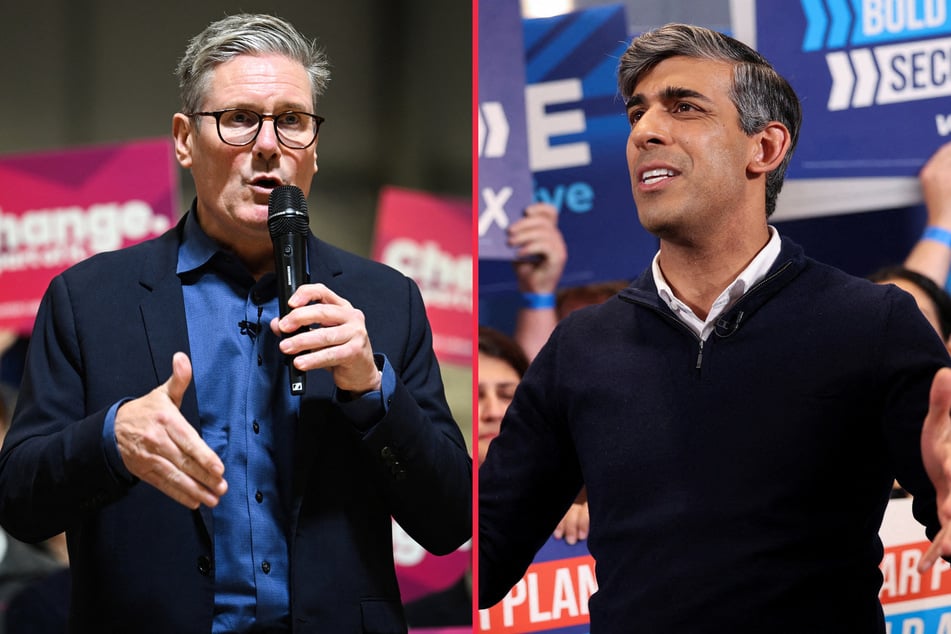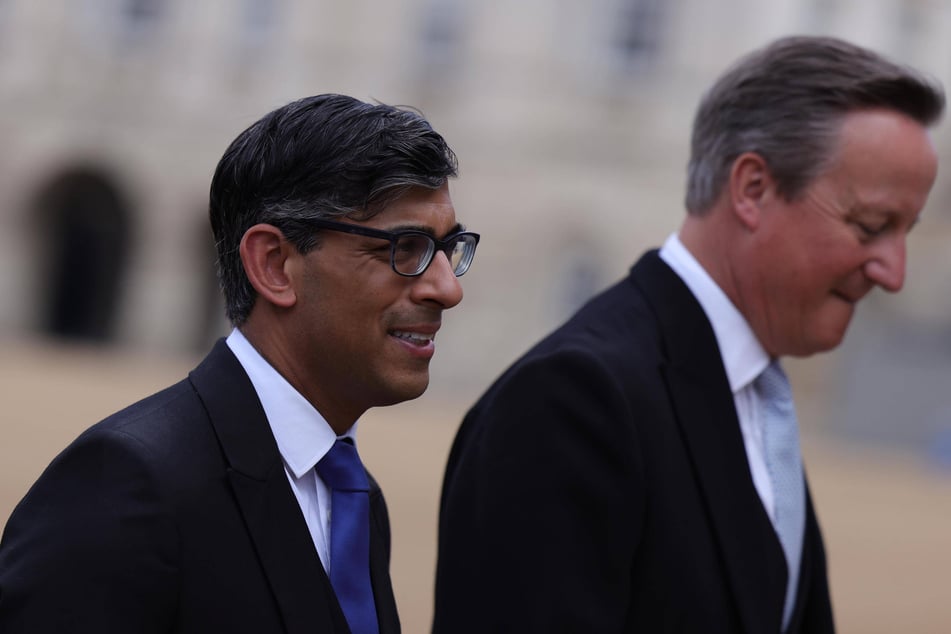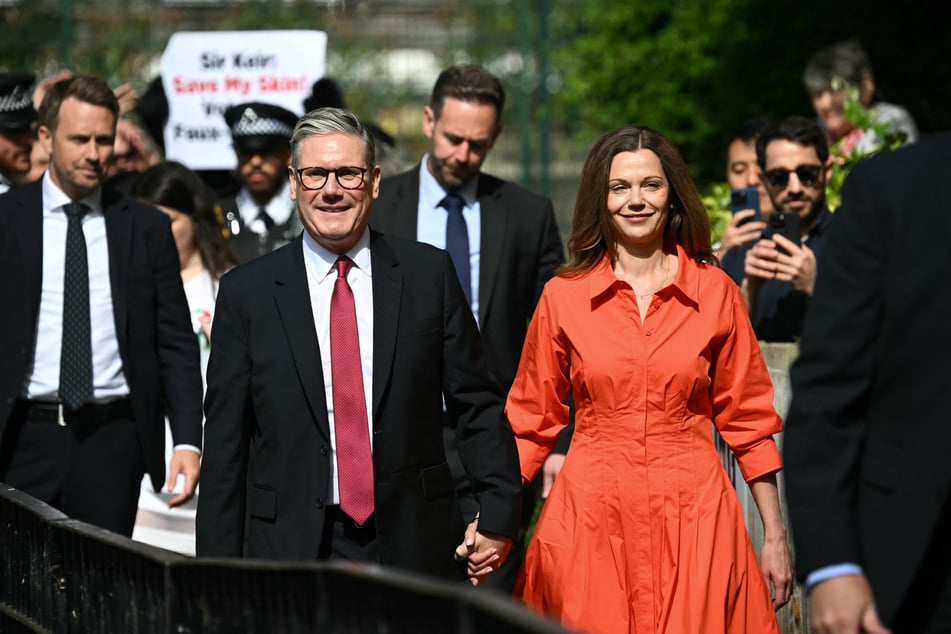UK heads to the polls: Who are the prime minister candidates Keir Starmer and Rishi Sunak?
London, UK - As the UK heads to the polls, the people of England, Scotland, Wales, and Northern Ireland are faced with a clear contrast between incumbent Tory (Conservative) Prime Minister Rishi Sunak and Labour leader Keir Starmer.

In British politics, things haven't been calm and stable for a long time. Since David Cameron won a historic landslide in 2015 dedicated to a Brexit referendum, the country was set on a path that has wound its way through five prime ministers.
For their own part, the Tories have tried hard to offer a sense of stability under Rishi Sunak after the scandals of Boris Johnson and the storm that was Liz Truss.
Yet, miles behind in the polls, the party that led the nation through Brexit and Covid seems unlikely to be in government tomorrow.
When it comes to Labour, though, things have been no less interesting. Jeremy Corbyn led the party for five years before departing after a failed election campaign that was fought amid accusations of antisemitism, which have also been criticized by many Jewish party members and Palestinians. His successor, Keir Starmer, has touted himself as a reformer who has fixed his party and is now intent upon fixing the country.
As the UK faces crises around health, immigration, housing, water, and poverty, will voters choose to stick with Rishi Sunak and the party that has overseen the last 14 years – or to make a change?
Who is Rishi Sunak, the UK's incumbent Tory prime minister?

Rishi Sunak was born into a family of Indian descent in the port city of Southampton, to Yashvir and Usha Sunak. His mother would go on to own and run an NHS pharmacy in their hometown, which Sunak never fails to mention.
Having studied at Winchester College and worked as a waiter at a local curry house, Sunak studied at Lincoln College, Oxford, before getting a master’s degree at Stanford in the US, where he met his future wife.
Akshata Murty, whom he would go on to marry in 2009, is the daughter of N. R. Narayana Murthy, who founded a multinational IT company in India and is considered one of the wealthiest people in the world.
Rishi Sunak was elected as the member of parliament for Richmond (Yorks) in 2015 and has since served as the chief secretary of the Treasury, as the chancellor of the Exchequer, and as the prime minister and Tory Party Leader.
While initially trying to project calm after the chaos of Truss' 49-day premiership, Sunak's two years in office have been swimming in an undercurrent of scandal, as conservative MPs fell like dominoes and government policy failed to see any bump in the polls.
The six-week election campaign began almost farcically, with Sunak drenched in the rain outside Number 10, desperately fighting to be heard as Tony Blair's 1997 anthem Things Can Only Get Better blasted from down the street.
Sunak is promising tax cuts, a move that he says will help to relieve weary pockets during a cost of living crisis. With a cut to the stamp duty tax on property purchases, the Conservatives aim to help young people into homeownership.
Most of Rishi Sunak's campaign has centered around the government's controversial Rwanda policy, as well as a call to reintroduce national service, increase defense spending, and fix the broken prison system.
Yet, Sunak finds himself permanently behind in the polls, battling for any semblance of electoral success. If predictions are correct, the Tories' 14-year run in office could end today with the biggest defeat in UK electoral history.
Who is Keir Starmer, Labour's leader of the opposition?

Keir Starmer doesn't have a background as dissimilar to Sunak's as you might expect, having also emerged from a relatively humble background as the son of a toolmaker (which he also never fails to mention).
Raised in Surrey, Starmer attended a selective Grammar School and became politically active from a very young age, joining the Labour Party Young Socialists at only 16. He went on to get a law degree at the University of Leeds and a civil law degree at Oxford.
The now-Labour leader spent many years as a practicing lawyer, specializing in human rights and working primarily in criminal defense. It wasn't until 2015, the same year as Sunak, that Keir Starmer entered the House of Commons as the member for Holborn and St. Pancras.
Starmer originally served under Jeremy Corbyn, playing an integral part in the former leader's shadow cabinet, first as shadow minister for immigration and then as shadow secretary for exiting the European Union. He campaigned for a second referendum on Brexit.
Following Corbyn's devastating defeat at the hands of Boris Johnson in 2019, Starmer was elected to lead the Labour Party. Since then, he has aggressively gone after antisemitism within the party and moved Labour's policies away from the hard left and further into the center ground.
Over the last six weeks, Starmer has seemed undefeatable. He set out ten key policies, primarily focused on fixing the NHS backlog and improving patient services, going after people smugglers, fixing the UK's water situation, and funding better support for victims of violence against women.
His two signature policies are charging of VAT on private school education as a way to improve the funding of state education and setting up Great British Energy, a publicly owned British energy company dedicated to a Green Prosperity Plan and the cutting of energy bills.
While the polls may give a clear indication of the expected result, we likely won't know until tonight whether it will be Starmer or Sunak who will lead the UK through the next five years. Whichever candidate wins, they've got a lot of work on their hands.
Cover photo: Collage: AFP/Andy Buchanan/Claudia Greco

